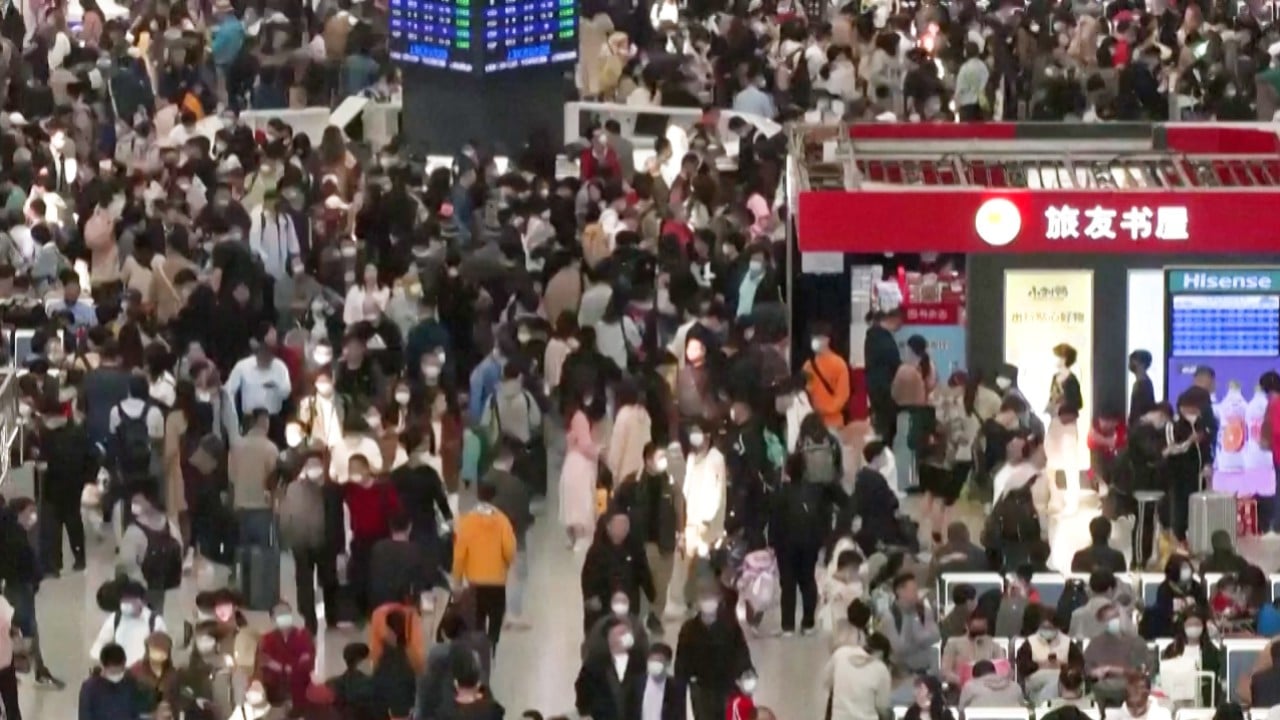
China’s ‘golden week’ holiday sees consumption boom as pent-up demand takes wing
- Extended holiday period spurs wave of domestic travel, boosting spending at a time when economic activity is sorely needed
- Growth forecasts adjusted upwards in light of positive developments, but analysts warn the uptick may be temporary as people return to routines
Cities across China have enjoyed pronounced spending sprees during the “golden week” holiday which wrapped up on Friday, but economists have warned the momentum may fade as pent-up demand fizzles out.
Data released by Chinese on-demand local services giant Meituan showed that average daily spending for services and retail shot up by 153 per cent across China, while consumption in dine-in services increased by 254 per cent compared with the same period in 2019.
China sees travel boom in first post-Covid ‘golden week’
Among all Chinese cities, Shanghai, Beijing, Chengdu, Chongqing and Shenzhen snatched the top five spots in terms of total consumption, while some niche tourism destinations – such as Linzhi of Tibet and Shanwei of Guangdong – saw the highest growth in hotel orders.
For the first seven days of the holiday, sales revenue of key retail and catering firms – as monitored by the Ministry of Commerce – rose by 9 per cent year on year. In major shopping streets across the country, meanwhile, the flow of consumers increased by 94.7 per cent.
Fliggy, an online travel platform under Alibaba Group, said the popularity of self-driving tours increased significantly during the holiday, with car rental orders rising more than 4.6 times compared to 2019. Alibaba owns the South China Morning Post.
In Hainan, a tropical tourist hub and duty-free shopping mecca at the southern tip of China, a total of 1.01 billion yuan (US$140.24 million) in duty-free sales was recorded from September 29 to October 4. This represented an increase of 94.2 per cent over the same time last year, according to figures released by Haikou Customs.
The total number of shoppers reached 130,000, an increase of 120 per cent, year on year.
According to the Ministry of Culture and Tourism, 826 million domestic trips were made over the eight-day holiday, up 71.3 per cent from last year and 4.1 per cent higher than the pre-pandemic level of 2019.
Domestic tourism revenue reached 753.43 billion yuan, up 129.5 per cent from last year but representing an increase of only 1.5 per cent from the 2019 level.
Movie industry data provider Dengta said as of Friday noon China’s box office during the golden week exceeded 2.6 billion yuan, compared to 1.5 billion yuan last year.
That figure, however, is still far below the 2019-21 average of 4.3 billion yuan. This can be partially attributed to a higher demand for travel that may have crowded out interest in the cinema, according to a note from Dongwu Securities on Friday.
China’s film industry rides summer wave of Covid-delayed movies. Will it last?
“The travel frenzy is obvious to all, and the per capita consumption during the long holiday has exceeded that of 2019 for the first time. This is a good sign,” it said.
“However, travel consumption has an insufficient spillover effect on real estate consumption and is not strong enough to be a substitute.
“The recovery of the economy and market in the fourth quarter requires more powerful policy pivots: debt reduction and the second round of real estate loosening.”
On Wednesday, Citigroup and J.P. Morgan raised their forecasts for China’s annual growth to 5 per cent – in line with Beijing’s growth target and up from 4.7 per cent and 4.8 per cent respectively.
‘This is huge’: Japan banks on a Chinese ‘golden week’-fuelled spending boost
While also raising the bank’s own 2023 growth forecast for China from 4.6 to 4.8 per cent, Nomura’s chief China economist Lu Ting cautioned the consumption boom might be cooling after the holiday, as pent-up demand for in-person services tapers off.
Although the country’s services PMI rose to 50.9 in September from 50.5 in August, the transport, accommodation and catering sectors – which led the service sector recovery earlier this year – all fell into contractionary territory last month, Lu said in a note last week.
“Looking ahead, as schools reopen and the summer season draws to a close, it seems the recovery momentum in the service sector may lose steam again, especially after the ongoing Golden Week holiday,” he concluded.


